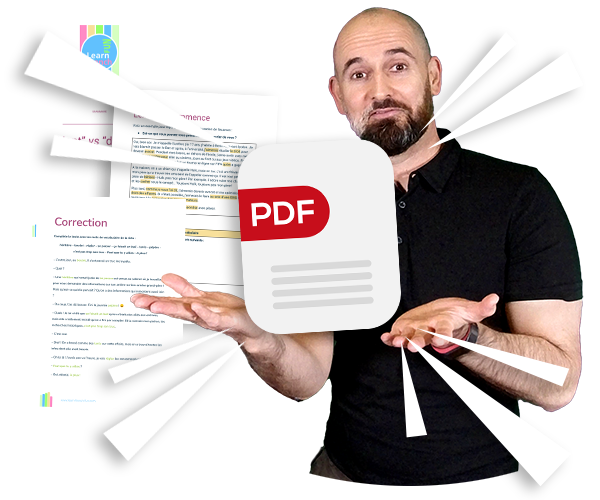Today I’m going to explain to you how French indirect personal pronouns work. And you’ll see that it’s not “book” grammar, the one you learn in books but which is absolutely useless when you find yourself in France trying to understand these strange creatures that are the French!
Les comprendre, c’est pas toujours facile, mais arriver à leur expliquer ce que toi, tu veux dire, et bien parfois, c’est vraiment difficile (It’s not always easy to understand them, but sometimes it’s really difficult to explain to them what you mean).
And toc, I put two little pronouns in this sentence: a direct pronoun and an indirect pronoun.

PDF Bonus
We have prepared a free PDF to help you understand and master French Indirect Pronouns (lui, leur…).
👉 Download it for free
At the end, you will have exercises to practice with the correction. 👍
What is the difference between indirect and direct pronouns in French?
Les comprendre, c’est pas toujours facile, mais arriver à leur expliquer ce que toi,
tu veux dire, et bien parfois, c’est vraiment difficile.
- Les comprendre…
Les, it is a direct pronoun. It replaces the object of the sentence, i.e. the Direct Object Complement (COD). We’ve already written an entire article on direct pronouns. I recommend that you read it as well to fully understand.
- …leur expliquer…
Leur, it is an indirect pronoun. It is used to replace: à + a person or an animal.
Expliquer à des personnes → Leur expliquer.
But we’ll explain it all in detail.
Do you like learning French with videos?
Receive our free video newsletter every Friday in your e-mail box. You will get 3 “Tips & Tricks” on grammar, vocabulary, phonetics or French culture.
👉👉 Sign up now!
What’s the difference between Lui and Leur?
The difference in French between lui and leur is a question of singular or plural:
- Do you want to replace il/elle (he/she)? Then you use lui.
- Do you want to replace ils/elles (they)? Then you use leur.
Let’s look at the list of French indirect pronouns
| You want to replace : | French indirect pronoun |
|---|---|
| je | me (m’ + word beginning with a vowel) |
| tu | te (t’ + word beginning with a vowel) |
| il | lui |
| elle | lui |
| nous | nous |
| vous | vous |
| ils | leur |
| elles | leur |
⚠️ Attention, leur is written without /s/.
Leurs with an /s/ exists, but it is a possessive word: mes parents et leurs amis (my parents and their friends…)
When to use indirect pronouns in French?
Indirect pronouns, it seems logical, are not direct, but in reality, what does it mean?
Indirect pronouns are used when you have a verb built with the preposition à.
For example: parler à (talk to), donner à (give to), demander à (ask to)…
And be careful, indirect pronouns are only used to replace à + a person or an animal.
For example:
- Tu parles à Franck en français ?
- Bien sûr que je lui parle en français.
- Tu as donné à manger aux chats ?
- Oh Oups, non, j’ai oublié de leur donner à manger.
Verb + à + something ?
But then, if the verb is indirect (with à) but it is followed by something: an object or an idea, and not by a person or an animal, what do we do?
In this case, you can’t use an indirect pronoun, you have to use another pronoun:
The pronoun “y”
💡 you will find a post about the pronoun y.
Examples:
- Tu as pensé à tes chaussures de randonnée ?
- Oui, j’y ai pensé.
(You thought about your hiking boots? Yes, I thought about it.)
- Tu t’intéresses à la politique extérieure de la France ?
- Heuuu, non, je ne m’y intéresse pas vraiment.
(Are you interested in the foreign policy of France? Heuuu, no, I’m not really interested.)
| Verb + à + someone (person or animal) | → indirect pronoun |
| Verb + à + something | → y |
Little secret, just between us, and don’t tell anyone… When you learn a new verb, it’s essential to also learn if that verb is followed by a preposition, and if so, what preposition.
Because that silly little word, the preposition (à, de, pour, chez, à gauche de, etc.), that thing that often means nothing, actually has the power to change what happens in the sentence!
Here are two super common verbs that we use all the time. The verbs:
- aider (to help)
- demander (to ask)
You probably know them, but have you also learned how they fit into a sentence.
Do you say:
aider quelqu’un or aider à quelqu’un ?
demander quelqu’un or demander à quelqu’un ?
Be careful, the answer to these questions is very important… You are risking your life… Heuuuu, no, don’t exaggerate.
So the answer:
1. We say aider quelqu’un. The verb to help has a direct construction, without preposition.
So, if you want to answer the question :
- Est-ce que tu as aidé ton frère ?
- Oui, je l’ai aidé.
(Did you help your brother ? Yes, I helped him).
2. The verb demander has an indirect construction: we say demander à quelqu’un.
So, to answer the following question:
- Est-ce que tu as demandé à ton frère s’il venait ce week-end ?
- Oui, je lui ai demandé.
(Did you ask your brother if he was coming this weekend? Yes, I asked him).
List of verbs
List of verbs with a direct construction (without preposition)
- aider quelqu’un – help someone
- appeler quelqu’un – call someone
- connaître quelqu’un – know someone
- dire quelque chose – say something
- demander quelque chose – ask for something
- savoir quelque chose – know something
- expliquer quelque chose – explain something
- offrir quelque chose – offer something
- écrire quelque chose – write something
- manger quelque chose – eat something
- ignorer quelqu’un (ou quelque chose) – ignore someone (or something)
- aimer-adorer-détester-préférer quelqu’un (ou quelque chose) – like-love-dislike-prefer someone (or something)
- quitter quelqu’un (ou quelque chose) – leave someone (or something)
- chercher quelqu’un (ou quelque chose) – look for someone (or something)
- comprendre quelqu’un (ou quelque chose) – understand someone (or something)
| 💡 I encourage you to download the FREE Little Bonus PDF. I have prepared a summary of the lesson to help you memorize it well, and exercises followed by the correction to practice. |
List of verbs with an indirect construction (with the preposition à)
- demander à quelqu’un – ask someone
- dire à quelqu’un – tell someone
- téléphoner à quelqu’un – phone someone
- écrire à quelqu’un – write to someone
- obéir à quelqu’un – obey someone
- offrir à quelqu’un – offer to someone
- expliquer à quelqu’un – explain to someone
- plaire à quelqu’un – please someone
- manquer à quelqu’un – miss someone
- parler à quelqu’un – talk to someone
- etc.
Example with the verb manquer (to miss)
To better explain how indirect pronouns fit into a sentence, I have chosen the example of a verb that often causes problems for students: the verb manquer (to miss).
The verb manquer has 2 uses:
1. The first is simple: je peux manquer quelque chose… (I can miss something). Direct verb.
Examples:
- Je peux manquer mon avion (I can miss my plane).
That means I was late and my plane left without me.

2. But the second use, the indirect verb is more often used in French: manquer à quelqu’un.
For example:
- Juliette manque à Roméo
Now you have to be very careful… Who is sad in the sentence Juliette manque à Roméo. Juliette or Romeo ?
It’s Romeo who is sad because his darling, his love, the woman of his life, Juliet is not here… Romeo misses Juliet, he misses Juliet.
And you know what I missed the most when I lived abroad, in England or in Germany, countries where I spent several years in my crazy youth? Well, what I missed the most was French cheeses…
- Les fromages français me manquaient, ils me manquaient
(I missed French cheeses, I missed them.)
So, tell me now… How are you going to translate I miss you into French?
So, there you have it! The different forms of French indirect pronouns and how to use them in a sentence.
Indirect pronouns are an important part of the French language, so make sure you practice using them as much as possible.
And don’t forget: if you ever have any questions, your teacher is always here to help.
À bientôt !
Articles that might interest you:
- The Imperative in French: How to Conjugate Verbs in Imperative? When do You Have to Use the Imperative?
- The 10 Irregular Verbs in the French Subjunctive Mood
- Depuis, pendant, en, il y a, dans
- All the secrets of the French gerund!
- French verb moods
- How to use the tonic pronouns in French?
- How to use “en” and “y” pronoun in French?
- Difference between DONT and DUQUEL in French
- 10 common French verbs conjugated in the present tense. Beware of traps!
- The Direct Object Complement in French (C.O.D.) and direct complement pronouns (le, la, les…)




3 thoughts on “French Indirect Pronouns (lui, leur…)”
Comments are closed.